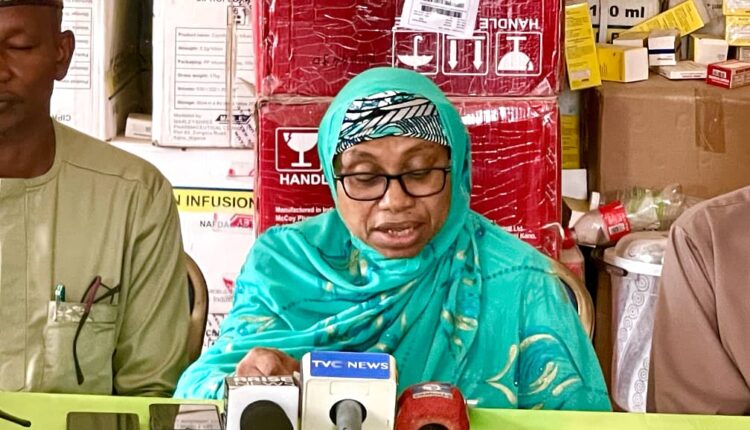Pharmaceutical products worth over ₦1.3 billion have been confiscated in Kano State following rigorous regulatory operations at the Kanawa Pharmaceutical Coordinated Wholesale Centre (KPP-CWC), situated at the Kano Economic City along Zaria Road.
Disclosing the development on Thursday, the Chief Superintendent Pharmacist at the centre, Hajiya Furera Ado Muhammed, said the seizure was a result of intensified quality control measures and oversight mechanisms instituted after the relocation of the once-notorious open drug market to the newly established centre.
“This centre has been a game changer,” Furera said. “Without its intervention, these substandard drugs would have made their way into the public, with devastating consequences—treatment failures, drug resistance, and avoidable deaths.”
The confiscated drugs, mostly pediatric antimalarials, antibiotics, and analgesics, were found to have failed Active Ingredient Content (AIC) tests, with as much as 40.3% of sampled products deemed substandard.
The seized items have since been handed over to the State Committee on Drug Abuse for destruction.
KPP-CWC is the only fully operational centre among the four originally approved under the Federal Ministry of Health’s Coordinated Wholesale Centre initiative.
The programme, spearheaded by the current Coordinating Minister of Health and Social Welfare, Prof. Muhammad Ali Pate, was designed to overhaul Nigeria’s chaotic drug distribution system.
“Although the pilot scheme was launched in Kano, Lagos, Anambra, and Abia, only Kano has successfully implemented it,” Furera stated.
Commissioned in February 2023 and made fully operational in early 2024 following a court ruling, the centre has become a model for pharmaceutical regulation in Nigeria.
Agencies such as the Pharmacy Council of Nigeria (PCN) and the National Agency for Food and Drug Administration and Control (NAFDAC) maintain real-time oversight of operations.
Among the innovations at the KPP-CWC is a World Health Organization-certified cold room imported from the United States, powered by 24-hour solar energy.
The facility ensures safe storage of thermolabile drugs, including vaccines, by maintaining temperatures between +2°C and +8°C, with options for sub-zero conditions when necessary.
To prevent future infiltration of fake drugs, the centre has set up a special committee to scrutinize all incoming pharmaceutical consignments—conducting vehicle searches, supply chain verifications, and lab testing for suspicious goods.
“We’ve reached a point where even experienced personnel can detect counterfeit medicines based on physical inspection alone,” Furera noted.
While acknowledging early challenges such as unstable power and sanitation issues, she lauded the progress made so far and appealed for more support from stakeholders.
She also urged the PCN to embark on public sensitisation campaigns to deepen awareness and compliance across the state and beyond.
Furera thanked Prof. Pate, PCN Registrar Pharm. Ibrahim Babashehu, and NAFDAC DG Prof. Mojisola Adeyeye for their leadership and support in making the centre a success.
She announced that the centre would soon begin hiring pharmacists nationwide to bolster its regulatory and distribution operations.
With Kano now taking the lead in sanitising Nigeria’s drug supply chain, health experts and stakeholders are calling for similar implementation across other states to protect millions of Nigerians from the dangers of fake and substandard medicines.
Do you want to share a story with us? Do you want to advertise with us? Do you need publicity for a product, service, or event? Contact us on WhatsApp +2348183319097 Email: platformtimes@gmail.com
We are committed to impactful investigative journalism for human interest and social justice. Your donation will help us tell more stories. Kindly donate any amount HERE




